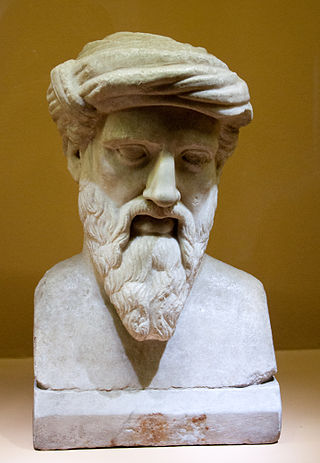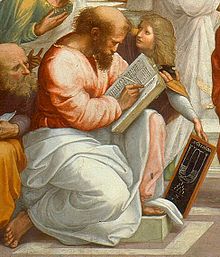In logic, the law of non-contradiction (LNC) states that contradictory propositions cannot both be true in the same sense at the same time, e. g. the two propositions "p is the case" and "p is not the case" are mutually exclusive. Formally, this is expressed as the tautology ¬(p ∧ ¬p). The law is not to be confused with the law of excluded middle which states that at least one, "p is the case" or "p is not the case", holds.

Pythagoras of Samos was an ancient Ionian Greek philosopher, polymath and the eponymous founder of Pythagoreanism. His political and religious teachings were well known in Magna Graecia and influenced the philosophies of Plato, Aristotle, and, through them, the West in general. Knowledge of his life is clouded by legend. Modern scholars disagree regarding Pythagoras's education and influences, but they do agree that, around 530 BC, he travelled to Croton in southern Italy, where he founded a school in which initiates were sworn to secrecy and lived a communal, ascetic lifestyle. This lifestyle entailed a number of dietary prohibitions, traditionally said to have included aspects of vegetarianism.
The philosophy of mathematics is the branch of philosophy that studies the assumptions, foundations, and implications of mathematics. It aims to understand the nature and methods of mathematics, and find out the place of mathematics in people's lives.
The history of logic deals with the study of the development of the science of valid inference (logic). Formal logics developed in ancient times in India, China, and Greece. Greek methods, particularly Aristotelian logic as found in the Organon, found wide application and acceptance in Western science and mathematics for millennia. The Stoics, especially Chrysippus, began the development of predicate logic.
In philosophy, rationalism is the epistemological view that "regards reason as the chief source and test of knowledge" or "any view appealing to reason as a source of knowledge or justification", often in contrast to other possible sources of knowledge such as faith, tradition, or sensory experience. More formally, rationalism is defined as a methodology or a theory "in which the criterion of truth is not sensory but intellectual and deductive".

Metamathematics is the study of mathematics itself using mathematical methods. This study produces metatheories, which are mathematical theories about other mathematical theories. Emphasis on metamathematics owes itself to David Hilbert's attempt to secure the foundations of mathematics in the early part of the 20th century. Metamathematics provides "a rigorous mathematical technique for investigating a great variety of foundation problems for mathematics and logic". An important feature of metamathematics is its emphasis on differentiating between reasoning from inside a system and from outside a system. An informal illustration of this is categorizing the proposition "2+2=4" as belonging to mathematics while categorizing the proposition "'2+2=4' is valid" as belonging to metamathematics.
Pluralism is a term used in philosophy, referring to a worldview of multiplicity, oft used in opposition to monism or dualism. The term has different meanings in metaphysics, ontology, epistemology and logic. In metaphysics, it is the view that there are in fact many different substances in nature that constitute reality. In ontology, pluralism refers to different ways, kinds, or modes of being. For example, a topic in ontological pluralism is the comparison of the modes of existence of things like 'humans' and 'cars' with things like 'numbers' and some other concepts as they are used in science.

Pythagoreanism originated in the 6th century BC, based on and around the teachings and beliefs held by Pythagoras and his followers, the Pythagoreans. Pythagoras established the first Pythagorean community in the ancient Greek colony of Kroton, in modern Calabria (Italy). Early Pythagorean communities spread throughout Magna Graecia.

Mathesis universalis is a hypothetical universal science modelled on mathematics envisaged by Descartes and Leibniz, among a number of other 16th- and 17th-century philosophers and mathematicians. For Leibniz, it would be supported by a calculus ratiocinator. John Wallis invokes the name as title in his Opera Mathematica, a textbook on arithmetic, algebra, and Cartesian geometry.

Hippasus of Metapontum was a Greek philosopher and early follower of Pythagoras. Little is known about his life or his beliefs, but he is sometimes credited with the discovery of the existence of irrational numbers. The discovery of irrational numbers is said to have been shocking to the Pythagoreans, and Hippasus is supposed to have drowned at sea, apparently as a punishment from the gods for divulging this and crediting it to himself instead of Pythagoras which was the norm in Pythagorean society. However, the few ancient sources who describe this story either do not mention Hippasus by name or alternatively tell that Hippasus drowned because he revealed how to construct a dodecahedron inside a sphere. The discovery of irrationality is not specifically ascribed to Hippasus by any ancient writer.
Universal science is a branch of metaphysics. In the work of Gottfried Wilhelm Leibniz, the universal science is the true logic. The idea of establishing a universal science originated in the seventeenth century with philosophers Francis Bacon and Rene Descartes. Bacon and Descartes conceptualized universal science as a unified approach to collect scientific information similar to encyclopedias of universal knowledge but were unsuccessful. Leibniz extended their ideas to use logic as an "index" to order universal scientific and mathematical information as an operational system with a universal language. Plato's system of idealism, formulated using the teachings of Socrates, is a predecessor to the concept of universal science and influenced Leibniz' s views against materialism in favor of logic. It emphasizes on the first principles which appear to be the reasoning behind everything, emerging and being in state with everything. This mode of reasoning had a supporting influence on great scientists such as Boole, Frege, Cantor, Hilbert, Gödel, and Turing. All of these great minds shared a similar dream, vision or belief in a future where universal computing would eventually change everything.
Moderatus of Gades was a Greek philosopher of the Neopythagorean school, who lived in the 1st century AD. He was a contemporary of Apollonius of Tyana. He wrote a great work on the doctrines of the Pythagoreans, and tried to show that the successors of Pythagoras had made no additions to the views of their founder, but had merely borrowed and altered the phraseology.

Platonism is the philosophy of Plato and philosophical systems closely derived from it, though contemporary Platonists do not necessarily accept all doctrines of Plato. Platonism had a profound effect on Western thought. In its most basic fundamentals, Platonism affirms the existence of abstract objects, which are asserted to exist in a third realm distinct from both the sensible external world and from the internal world of consciousness, and is the opposite of nominalism. This can apply to properties, types, propositions, meanings, numbers, sets, truth values, and so on. Philosophers who affirm the existence of abstract objects are sometimes called Platonists; those who deny their existence are sometimes called nominalists. The terms "Platonism" and "nominalism" also have established senses in the history of philosophy. They denote positions that have little to do with the modern notion of an abstract object.
The Latin term characteristica universalis, commonly interpreted as universal characteristic, or universal character in English, is a universal and formal language imagined by Gottfried Leibniz able to express mathematical, scientific, and metaphysical concepts. Leibniz thus hoped to create a language usable within the framework of a universal logical calculation or calculus ratiocinator.
Western philosophy refers to the philosophical thought and work of the Western world. Historically, the term refers to the philosophical thinking of Western culture, beginning with the ancient Greek philosophy of the pre-Socratics. The word philosophy itself originated from the Ancient Greek philosophía (φιλοσοφία), literally, "the love of wisdom" Ancient Greek: φιλεῖν phileîn, "to love" and σοφία sophía, "wisdom").
Abstract object theory (AOT) is a branch of metaphysics regarding abstract objects. Originally devised by metaphysician Edward Zalta in 1981, the theory was an expansion of mathematical Platonism.

The Quine–Putnam indispensability argument is an argument in the philosophy of mathematics for the existence of abstract mathematical objects such as numbers and sets, a position known as mathematical platonism. It was named after the philosophers Willard Quine and Hilary Putnam, and is one of the most important arguments in the philosophy of mathematics.

The Italian School of Pre-Socratic philosophy refers to Ancient Greek philosophers in Italy or Magna Graecia in the 6th and 5th century BC. The doxographer Diogenes Laërtius divides pre Socratic philosophy into the Ionian and Italian School. According to classicist Jonathan Barnes, "Although the Italian 'school' was founded by émigrés from Ionia, it quickly took on a character of its own." According to classicist W. K. C. Guthrie, it contrasted with the "materialistic and purely rational Milesians."










